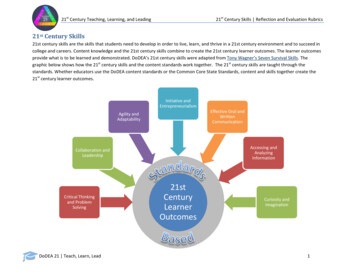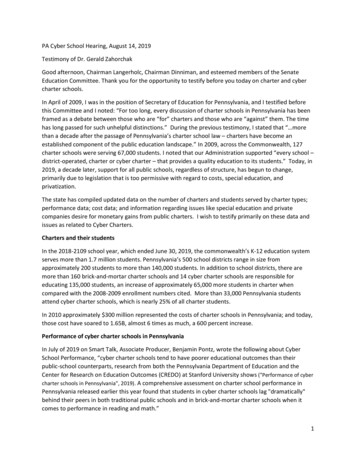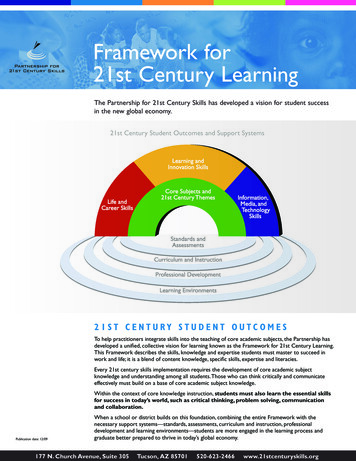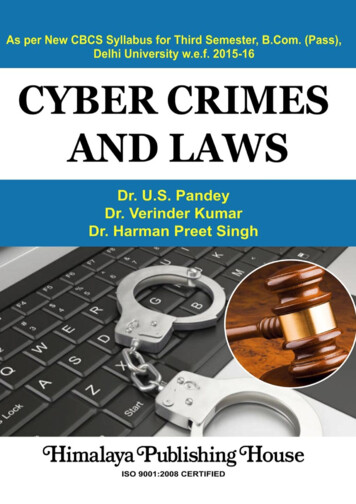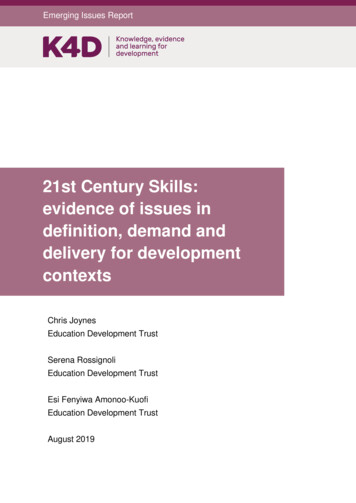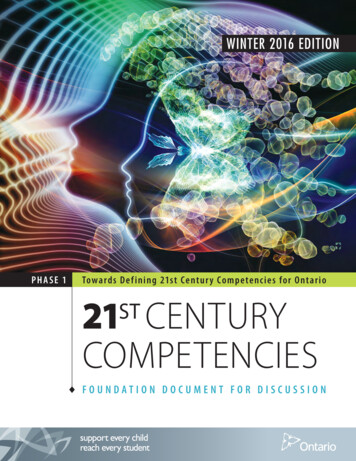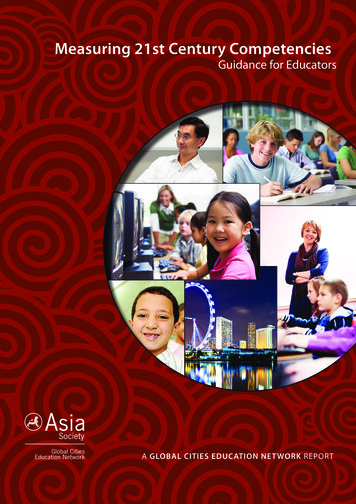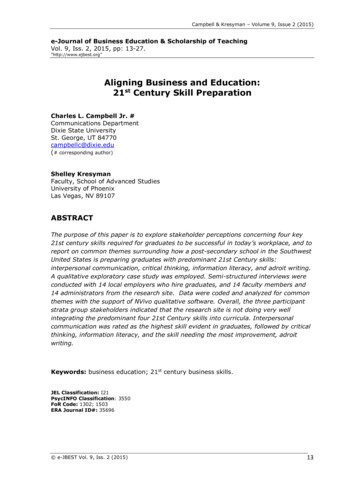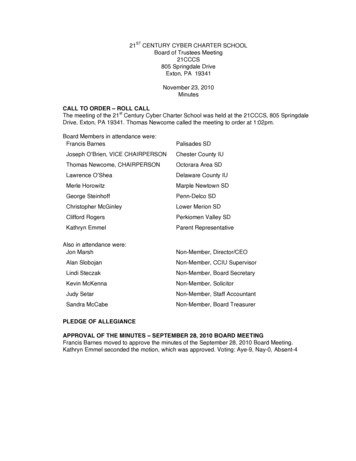
Transcription
21STCENTURY CYBER CHARTER SCHOOLBoard of Trustees Meeting21CCCS805 Springdale DriveExton, PA 19341November 23, 2010MinutesCALL TO ORDER – ROLL CALLstThe meeting of the 21 Century Cyber Charter School was held at the 21CCCS, 805 SpringdaleDrive, Exton, PA 19341. Thomas Newcome called the meeting to order at 1:02pm.Board Members in attendance were:Francis BarnesPalisades SDJoseph OʼBrien, VICE CHAIRPERSONChester County IUThomas Newcome, CHAIRPERSONOctorara Area SDLawrence OʼSheaDelaware County IUMerle HorowitzMarple Newtown SDGeorge SteinhoffPenn-Delco SDChristopher McGinleyLower Merion SDClifford RogersPerkiomen Valley SDKathryn EmmelParent RepresentativeAlso in attendance were:Jon MarshNon-Member, Director/CEOAlan SlobojanNon-Member, CCIU SupervisorLindi SteczakNon-Member, Board SecretaryKevin McKennaNon-Member, SolicitorJudy SetarNon-Member, Staff AccountantSandra McCabeNon-Member, Board TreasurerPLEDGE OF ALLEGIANCEAPPROVAL OF THE MINUTES – SEPTEMBER 28, 2010 BOARD MEETINGFrancis Barnes moved to approve the minutes of the September 28, 2010 Board Meeting.Kathryn Emmel seconded the motion, which was approved. Voting: Aye-9, Nay-0, Absent-4
PRESENTATIONS AND REPORTSTom Newcome (Chairperson), Alan Slobojan (CCIU Supervisor), and Jon Marsh (Director/CEO)gave a presentation on Blended Learning as the New Alternative Program.Jon Marsh, Director/CEO, highlighted the following items from the reports. (The reports are on fileat the 21CCCS)ADMINISTRATIONAudit Closing MeetingNational PresentationsPASCCR - Financial Review2009-10 Tuition ReconciliationsMiddle School Math CertificationSCHOOL OPERATIONSPSSA Senior RetestStudent AchievementSummer SchoolTeaching Partnership with CCIU Schools ContinuesField TripsCURRICULUMTeaching AssistantsTutoringMiddle School SynchronousCurriculum CommitteeSPECIAL SERVICESSpecial Education CountSpecial Education Compliance MonitoringSpecial Education SupervisionSTUDENT SUPPORTFixed Asset AuditEnrollment ProfileWithdraw ReportJanuary 2011 EnrollmentBVA EnrollmentsAuction of Old Equipment4-Year Graduation Cohort Graduation RateLunchtime Tech SeminarsField Trip Tech Support/Parent TrainingStudent PrintersCONSENT AGENDAFrancis Barnes moved to approve the following consent agenda items:Finance, DFinance, ENew Business, BTreasurerʼs Report as of October 31, 2010Expenditure Report as of October 31, 2010Approval of ContractsChristopher McGinley seconded the motion, which was approved. Voting: Aye-9, Nay-0, Absent-4
21st Century Cyber Charter SchoolTreasurer's Report as of October 31, 2010(Unaudited Results) 2,436,490Unaudited Fund Balance at June 30, 20102010-11 OriginalBudgetRevenue:Revenue from Other LEAsRevenue - IDEA/ARRASummer School TuitionRevenue - Health ServicesMiscellaneous RevenueState Share Social SecurityState Share RetirementAccounts Receivable OutstandingYTD 2009-10 RevenueTotal Funds AvailableExpenditures:100 Salaries200 Employee Benefits300 Purchased Professional Services322 Professional Educational Services - IUs324 Employee Training and Conferences329 Professional Services Consultants330 Other Professional Services340 Technical Services350 Safety and Security Services390 Professional Contract Services391 Professional and Staff Development400 Purchased Property Services410 Janitorial Services430 Repairs & Maintenance440 Rentals441 Rental - Land and Building460 Exterminating Services500 Other Purchased Services513 Contracted Carriers523 Insurance530 Postage531 Telephone538 ISP540 Advertising550 Printing and Binding560 Tuition580 Travel600 Supplies610 Supplies618 Administrative Software620 Energy640 Books & Periodicals648 Educational Software & Licenses700 Equipment750 Equipment757 Computers800 Other Objects810 Dues and Fees840 Contingency890 Miscellaneous ExpensesCCIU - Admin FeeYTD 2010-11 ExpendituresNet Revenue/(Expenditures)Total Fund Balance 10/31/10 1,391October 2010YTD Results ,429 4,508,919 3,110,8321,415,168 2,43147,896663,800369,874 6,66480,00018,602289,0977,516,511 3,3261,97370,3231,828,393 14,880 244,036 2,451,370 2,680,526
21st Century Cyber Charter SchoolTreasurer's Report as of October 31, 2010(Unaudited Results) 1,410,727Audited Fund Balance at June 30, 2009Unaudited Excess Revenue over Expenditures 7/01/09 - 6/30/10 1,025,763 2,436,490Unaudited Fund Balance at June 30, 2010Unaudited Excess Expenditures over Revenue 7/01/10 - 10/31/10Unaudited Total Fund Balance at 10/31/2010Designated Fund Balances:New Initiatives FundProgram Stabilization Fund (approved 1/22/07 for 500,000)Curriculum DevelopmentCapital Equipment & HardwareSpectrum Furniture purchase for staff expansion (Approved May 2010)2010-11 Purchases to be made with ARRA fundsNew Building FundReserved for Prepaid ExpensesReserved for EncumbrancesTotal Designated Fund BalancesUndesignated Fund Balance at 10/31/10Results subject to change based on 09-10 year-end audit.PSERS STABILIZATION Funds as of 10/31/10 244,036 2,680,526 224,000 500,000 70,000 0 120,000 8,978 750,000 0 0 1,672,978 1,007,548 103,488
FINANCEAPPROVAL OF AUDITORMerle Horowitz moved to approve the engagement of Herbein & Company, Inc. Certified PublicAccountants to perform the Financial Audits of 21CCCS for the years ending 2010, 2011, and2012 not to exceed the fee amounts listed below:Year201020112012Fee 8,950 9,100 9,250Francis Barnes seconded the motion, which was approved. Voting: Aye-9, Nay-0, Absent-4FILEMAKER SERVER PURCHASEJoseph OʼBrien moved to approve the purchase of a FileMaker server and associated software ata cost not to exceed 11,000. Kathryn Emmel seconded the motion, which was approved. Voting:Aye-9, Nay-0, Absent-4MATH INCENTIVE PROGRAM FUNDINGFrancis Barnes moved to approve the use of up to 25,000 from the New Initiative Fund for theMath Incentive Program. Lawrence OʼShea seconded the motion, which was approved. Voting:Aye-9, Nay-0, Absent-4OLD BUSINESSNEW BUSINESSPOLICY APPROVALSMerle Horowitz moved to adopt the following policies:Alternate Assessment of Students PolicyAnnual Notice of Special Education Services PolicyAssistive Technology (AT) PolicyChild Find Policy and Public Outreach Awareness SystemDisciplinary Exclusions Of Special Education Students PolicyDisproportionally PolicyDispute resolution PolicyExceptional Student Records Policy/Confidentiality PolicyExtended School Year (ESY) PolicyInclusion PolicyIndependent Evaluation PolicyIEP Team Meeting / IDEA 2004 Meeting Participation PolicyInstruction Conducted in the Home and Homebound Instruction PolicyIntensive Interagency PolicyLeast Restrictive EnvironmentPositive Behavioral Support PolicyPsychological Services PolicyRelated Services PolicySpecial Education Student Enrollment PolicySpecial Education Training PolicySurrogate Parent PolicyFrancis Barnes seconded the motion, which was approved. Voting: Aye-9, Nay-0, Absent-4
RESOLUTION OF THE SPECIAL EDUCATION POLICIESJoseph OʼBrien moved to accept the Resolution of the Special Education Policies which wereadopted on the January 26, 2010 Board Meeting remain in effect to the extent that they areconsistent with 21CCCSʼ obligations under applicable federal and state laws and regulationsincluding Chapter 711 of Title 22 of the Pennsylvania Code and to the extent that they areconsistent with cyber charter school responsibilities and obligations cited therein madespecifically applicable under law to cyber charter schools. Any references in the model policiesspecifically applicable to PDE, school districts and/or IUs that do not otherwise apply to charterschools pursuant to applicable federal and state laws and regulations shall not be construed toobligate 21CCCS to take on any responsibilities, actions or liabilities that conflict with and/orsupplant 21CCCS obligations under applicable state and federal laws and regulations. The Boardof Trustees of 21CCCS hereby adopts the special education policies in order to supplementpreviously adopted model policies and to direct 21CCCSʼ compliance with current applicablefederal and state laws and regulations regarding special education. Merle Horowitz seconded themotion, which was approved. Voting: Aye-8, Nay-0, Absent-5 Francis Barnes was not present atthe time of the vote.PERSONNELAPPROVAL OF PERSONNEL ACTIONSMerle Horowitz moved to approve the routine terminations/resignations/retirements, nominations,stand changes in status of the 21 Century Cyber School staff as follows:NominationsProfessionalDeborah ParvinSpanish TeacherEffective:November 22, 2010Reason:Fill Open PositionRelationship: NoneSupportCatherine EhretTeaching Assistant (195 Days)Effective:November 8, 2010Reason:Fill Open PositionRelationship: NoneJames CollinsTeaching Assistant (195 Days)Effective:November 8, 2010Reason:Fill Open PositionRelationship: NoneGeorge Steinhoff seconded the motion, which was approved. Voting: Aye-9, Nay-0, Absent-4
BOARD MEMBER COMMENTPUBLIC COMMENTEXECUTIVE SESSION ANNOUNCEMENTTHE NEXT MEETING IS SCHEDULED TO BE HELD ON JANUARY 25, 2011 AT THE PATTANCENTER, 200 ANDERSON ROAD, KING OF PRUSSIA, PA 19406AN EXECUTIVE SESSION IS SCHEDULED TO BE HELD AT 12:30PM. TOPICS WILL INCLUDEPERSONNEL, LABOR RELATIONS, AND REAL ESTATE.ADJOURNMENTADJOURNMENTKathryn Emmel moved to adjourn the meeting at 2:10pm. Merle Horowitz seconded the motion,which was approved. Voting: Aye-9, Nay-0, Absent-4
POLICY #:SECTION:TITLE:Alternate Assessment ofStudents PolicyADOPTED:REVISED:The Director/CEO or his/her designee shall ensure that all children withdisabilities are included in all general state and district-wide assessment programs,including the PSSA, with appropriate accommodations and alternate assessmentswhere necessary and as indicated in their respective IEPs.Alternate assessments such as the PASA must be aligned with the state’sacademic content standards and student academic achievement standards or if the statehas adopted alternate academic achievement standards, measure the achievement ofchildren with disabilities against those standards.21st Century Cyber Charter School (21CCCS) must maintain informationregarding the number of children who: participate in regular assessments; wereprovided accommodations in order to participate in those assessments; and participatein alternate assessments.The Director/CEO or his/her designee is directed to develop procedures toensure that students with disabilities participate in the PSSA or PASA to the extentconsistent with applicable law.The Director/CEO or his/her designee is directed to monitor studentparticipation in statewide assessment to foster participation.The Director/CEO or his/her designee is directed to provide trainingopportunities to personnel regarding statewide assessment participation and PSSA andPASA requirements.The Director/CEO or his/her designee is directed to make Pennsylvania’sguidelines regarding statewide assessments available to personnel.The Director/CEO or his/her designee is directed to develop procedures toprepare students in test-taking techniques prior to test administration.November 23, 2010Board Meeting AgendaBACKUP MATERIALSPage 44GRAY
The Director/CEO or his/her designee is directed to review assessment data anduse data to drive any needed program changes. The Director/CEO or his/her designeeis directed to report to the Board what changes are recommended and needed.The Director/CEO or his/her designee must maintain information regarding theperformance of children with disabilities on regular assessments and on alternateassessments.IEPs must include a description of benchmarks or short-term objectives forchildren who take alternate assessments aligned to alternate achievement standards.IEPs must include a statement of any accommodations that are necessary tomeasure the academic achievement and functional performance of the child onstatewide and district-wide assessments consistent with law.IEPs must, if the IEP team determines that the child shall take an alternateassessment on a particular statewide or school-wide assessment of studentachievement, provide a statement of why the child cannot participate in the regularassessment, and why the particular alternate assessment selected is appropriate for thechild.TO THE EXTENT THAT ANYTHING IN THIS POLICY COULD BE CONSTRUEDTO CONFLICT WITH THE SCHOOL’S CHARTER OR APPLICABLE STATEAND/OR FEDERAL LAWS, THE APPLICABLE STATE AND/OR FEDERAL LAWSAND/OR CHARTER CONTROL.References20 USC 1412(a)(15);34 CFR 300.157;22 Pa. Code §711.3(b)(15) & 22 Pa. Code §4.51November 23, 2010Board Meeting AgendaBACKUP MATERIALSPage 45GRAY
POLICY #:SECTION:TITLE:Annual Public Notice of SpecialEducation Services and Programsand Rights for Students with Disabilitiesand Notification of Rights under theFamily Educational Rights and PrivacyAct--2010-2011 School YearADOPTED:REVISED:All children with disabilities residing in the Commonwealth, regardless of the severity of theirdisabilities, and who are in need of special education and related services, are to be located, identifiedand evaluated. This responsibility is required by a federal law called the Individuals with DisabilitiesEducation Improvement Act of 2004, 20 U.S.C. 1200 et. seq. (“IDEA 2004”).Chapter 711 of Title 22 of the Pennsylvania Code requires the publication of a notice to parentsregarding public awareness activities sufficient to inform parents of children applying to or enrolledin the 21st Century Cyber Charter School (21CCCS) of available special education services andprograms and how to request those services and programs and of systematic screening activities thatlead to the identification, location and evaluation of children with disabilities enrolled in the 21CCCS.In addition, the federal Family Educational Rights and Privacy Act of 1974 (FERPA), which protectsconfidentiality, requires educational agencies to notify parents annually of their confidentiality rights.The 21CCCS fulfills its duties with this annual notice and has incorporated several sections of thePaTTAN Procedural Safeguards Notice and other applicable guidelines from the PennsylvaniaDepartment of Education into the Board-approved Child Find Notice, and Policies and Proceduresdescribed below. The 21CCCS also directs parents to the procedural safeguards notice fromPaTTAN available at the school’s main office for additional information regarding rights andservices. Parents may contact the 21CCCS’s Director/CEO at 805 Springdale Drive, Exton, PA 19341,(484) 875-5400 at any time to request a copy of the procedural safeguards notice or with any otherquestions about special education, services, screenings, policies or procedures. The ProceduralSafeguards Notice is provided to parents by the 21CCCS once per school year or: (1) upon initialreferral or parent request for evaluation; (2) upon filing by parents of their first State complaint under34 CFR §§300.151 through 300.153 and upon filing by parents of their first due process complaintunder §300.507 in a school year; (3) when a decision is made to take a disciplinary action thatconstitutes a change of placement; and (4) upon parent request.The purpose of this annual notice is to comply with the 21CCCS’s obligations under Chapter 711 ofTitle 22 of the Pennsylvania Code and to describe: (1) the types of disabilities that might qualify thechild for special education, (2) the special education programs and related services that are available,(3) the process by which the 21CCCS screens and evaluates such students to determine eligibility, (4)November 23, 2010Board Meeting AgendaBACKUP MATERIALSPage 46GRAY
the special rights that pertain to such children and their parents or legal guardians and (5) theconfidentiality rights that pertain to student information.A copy of this Annual Notice is also available on the school’s website at: www.21stcenturycyber.orgQualifying for special education and related servicesUnder the federal Individuals with Disabilities Education Improvement Act of 2004, or “IDEA 2004,”children qualify for special education and related services if they have one or more of the followingdisabilities and, as a result, need special education and related services: mental retardation; hearingimpairment, including deafness; speech or language impairment; visual impairment, includingblindness; serious emotional disturbance; orthopedic impairment; autism; traumatic brain injury;other health impairment; specific learning disability; deaf-blindness; or multiple disabilities.IDEA 2004 provides legal definitions of the disabilities that qualify a student for special education,which may differ from those terms used in medical or clinical practice or common usage.Section 504 ServicesUnder Section 504 of the federal Rehabilitation Act of 1973, some school age children with disabilitieswho do not meet the eligibility criteria outlined above might be eligible for special protections and foradaptations and accommodations in instruction, facilities, and activities. Children are entitled to suchprotections, adaptations, and accommodations if they have a mental or physical disability thatsubstantially limits or prohibits participation in or access to an aspect of the school program andotherwise qualify under the applicable state and federal laws, including Chapter 711 of Title 22 of thePennsylvania Code and Section 504.The 21CCCS must ensure that qualified handicapped students have equal opportunity to participatein the school program and activities to the maximum extent appropriate for each individual student.In compliance with applicable state and federal laws, the 21CCCS provides to each qualifyingprotected handicapped student without discrimination or cost to the student or family, those relatedaids, services or accommodations which are needed to provide equal opportunity to participate inand obtain the benefits of the school program and activities to the maximum extent appropriate to thestudent’s abilities and to the extent required by the laws.These services and protections for “protected handicapped students” may be distinct from thoseapplicable to eligible or thought-to-be eligible students. The 21CCCS or the parent may initiate anevaluation if they believe a student is a protected handicapped student. For further information onthe evaluation procedures and provision of services to protected handicapped students, parentsshould contact the school’s Director/CEO at 805 Springdale Drive, Exton, PA 19341, (484) 875-5400.Children Below Mandatory School AgeIf a 21CCCS admits children below school age, early intervention services may be available to eligiblechildren with special needs. Any questions about services available to children under school ageshould be directed to the Director/CEO at 805 Springdale Drive, Exton, PA 19341, (484) 875-5400.Least Restrictive Environment “LRE”21CCCS ensure that children with disabilities are educated to the maximum extent possible in theregular education environment or “least restrictive environment”. To the maximum extentNovember 23, 2010Board Meeting AgendaBACKUP MATERIALSPage 47GRAY
appropriate, students with disabilities are educated with students who are not disabled. Specialclasses, separate schooling or other removal of students with disabilities from the general educationalenvironment occurs only when the nature or severity of the disability is such that education ingeneral education classes, even with the use of supplementary aids and services, cannot be achievedsatisfactorily. Programs and services available to students with disabilities, might include: (1) regularclass placement with supplementary aides and services provided as needed in that environment; (2)regular class placement for most of the school day with itinerant service by a special educationteacher either in or out of the regular classroom; (3) regular class placement for most of the school daywith instruction provided by a special education teacher in a resource classroom; (4) part time specialeducation class placement in a regular public school or alternative setting; and (5) special educationclass placement or special education services provided outside the regular class for most or all of theschool day, either in a regular public school or alternative setting.Depending on the nature and severity of the disability, a 21CCCS can provide special educationprograms and services as determined by the IEP team, in locations such as: (1) theclassroom/building the child would attend if not disabled, (2) an alternative regular class either in oroutside the school, (3) a special education center operated by an IU, (4) an approved private school orother private facility licensed to serve children with disabilities, (5) a residential school, (6) approvedout-of-state program, or (7) the home.Special education services are provided according to the educational needs of the child, not thecategory of disability. Types of service that may be available, depending upon the child’s disabilityand needs include, but are not limited to: (1) learning support; (2) life skills support; (3) emotionalsupport; (4) deaf or hearing impaired support; (5) blind or visually impaired support; (6) physicalsupport; (7) autistic support; (8) multiple disabilities support; (9) speech and language support (10)extended school year support; and (11) vision support.Related services are designed to enable the child to participate in or access his or her program ofspecial education. Examples of related services that a child may require include but are not limited to:speech and language therapy, transportation, occupational therapy, physical therapy, school nursingservices, audiology counseling services, parent counseling, or training, certain medical services fordiagnostic or evaluation purposes, social work, recreation, and transition. Some students may also beeligible for extended school year services if determined needed by their IEP teams in accordance withChapter 711 regulations.The 21CCCS, in conjunction with the parents, determines the type and intensity of special educationand related services that a particular child needs based on the unique program of special educationand related services that the school develops for that child. The child’s program is described inwriting in an individualized education program, or “IEP,” which is developed by an IEP team. Theparticipants in the IEP team are dictated by IDEA 2004. The parents of the child have the right to benotified of and to be offered participation in all meetings of their child’s IEP team. The IEP is revisedas often as circumstances warrant but reviewed at least annually. The law requires that the programand placement of the child, as described in the IEP, be reasonably calculated to ensure meaningfuleducational benefit to the student. In accordance with IDEA 2004, there may be situations in which a21CCCS may hold an IEP team meeting if the parents refuse or fail to attend the IEP team meeting.IEPs generally contain: (1) a statement of the student’s present levels; (2) a statement of measurableannual goals established for the child; (3) a statement of how the child’s progress toward meeting theannual goals will be measured and when periodic reports will be provided; (4) a statement of thespecial education and related services and supplementary aids and services and a statement of theprogram modifications or supports for school personnel that will be provided, if any; (5) anNovember 23, 2010Board Meeting AgendaBACKUP MATERIALSPage 48GRAY
explanation of the extent, if any, to which the child will not participate with nondisabled children inthe regular class and in activities; (6) a statement of any individual appropriate accommodations thatare necessary to measure the performance of the child on State and school assessments; and (7) theprojected date for the beginning of the services and modifications and the anticipated frequency,location and duration of those services or modifications.Beginning not later than the first IEP to be in effect when the child turns 14, or younger if determinedappropriate by the IEP Team, and updated annually, thereafter, the IEP must include appropriatemeasurable postsecondary goals and transition services needed to assist in reaching those goals. The21CCCS must invite the child to the IEP team meeting at which the transition plan is developed.Beginning not later than one year before the child reaches the age of majority under State law, the IEPmust include a statement that the child has been informed of the child’s rights, if any, that willtransfer to the child on reaching the age of majority.Screening and Evaluation Procedures for Children to Determine EligibilityScreeningThe 21CCCS has established a system of screening which may include prereferral interventionservices to accomplish the following:(1) Identification and provision of initial screening for students prior to referral for a specialeducation evaluation.(2) Provision of peer support for teachers and other staff members to assist them in workingeffectively with students in the general education curriculum.(3) Identification of students who may need special education services and programs.The screening process includes:Hearing and vision screening in accordance with Section 1402 of the Public School Code of1949 (24 P. S. § 14-1402) for the purpose of identifying students with hearing or vision difficulty sothat they can be referred for assistance or recommended for evaluation for special education.Screening at reasonable intervals to determine whether all students are performing based ongrade-appropriate standards in core academic subjects.The 21CCCS has established and implements procedures to locate, identify and evaluatechildren suspected of being eligible for special education. These procedures involve screeningactivities which may also include but are not limited to: review of data and student records; motorscreening; and speech and language screening. The school assesses the current achievement andperformance of the child, designs school-based interventions, and assesses the effectiveness ofinterventions. If the concern can be addressed without special education services, or is the result oflimited English proficiency or appropriate instruction, a recommendation may be made forinterventions other than a multidisciplinary team evaluation. Parents have the right to request amultidisciplinary team evaluation at any time, regardless of the outcome of the screening process.In accordance with Chapter 711, in the event that the 21CCCS would meet the criteria in 34CFR 300.646(b)(2) (relating to disproportionality), as established by the State Department ofEducation, the services that would be required would then include:November 23, 2010Board Meeting AgendaBACKUP MATERIALSPage 49GRAY
(1) A verification that the student was provided with appropriate instruction in reading,including the essential components of reading instruction (as defined in section 1208(3) of theElementary and Secondary Education Act (ESEA) (20 U.S.C.A. § 6368(3)), and appropriate instructionin math.(2) For students with academic concerns, an assessment of the student's performance inrelation to State-approved grade level standards.(3) For students with behavioral concerns, a systematic observation of the student's behaviorin the school environment where the student is displaying difficulty.(4) A research-based intervention to increase the student's rate of learning or behavior changebased on the results of the assessments under paragraph (2) or (3), or both.(5) Repeated assessments of achievement or behavior, or both, conducted at reasonableintervals, reflecting formal monitoring of student progress during the interventions.(6) A determination as to whether the student's assessed difficulties are the result of a lack ofinstruction or limited English proficiency.(7) A determination as to whether the student's needs exceed the functional ability of theregular education program to maintain the student at an appropriate instructional level.(8) Documentation that information about the student's progress as identified in paragraph(5) was periodically provided to the student's parents.Except as indicated above or otherwise announced publicly, screening activities take placeon-going at periods throughout the school year. Screening is conducted at the 21CCCS, unless otherarrangements are necessary or arranged.The screening of a student by a teacher or specialist to determine appropriate instructionalstrategies for curriculum implementation is not to be considered an evaluation for eligibility forspecial education and related services.If parents need additional information regarding the purpose, time, and location ofscreening activities, they should call or write the Director/CEO of 21CCCS at:21st Century Cyber 21CCCS805 Springdale DriveExton, PA 19341(484) 875-5400Screening or prereferral intervention activities may not serve as a bar to the right of a parentto request an evaluation, at any time, including prior to or during the conduct of screening orprereferral intervention activities.EvaluationAn evaluation under IDEA 2004 involves the use of a variety of assessment tools and strategies togather relevant functional, developmental, and academic information about the child, includinginformation provided by the parent that may assist in determining whether the child is a child with adisability and the content of the child’s IEP. The 21CCCS does not use any single measure orassessment as a sole criterion for determining whether a child is a child with a disability and fordetermining an appropriate educational pro
21ST CENTURY CYBER CHARTER SCHOOL Board of Trustees Meeting 21CCCS 805 Springdale Drive Exton, PA 19341 November 23, 2010 . Christopher McGinley Lower Merion SD Clifford Rogers Perkiomen Valley SD Kathryn Emmel Parent Representative . 100 Salaries 3,110,832 616,173 200 Employee Benefits 1,415,168 306,145 .
